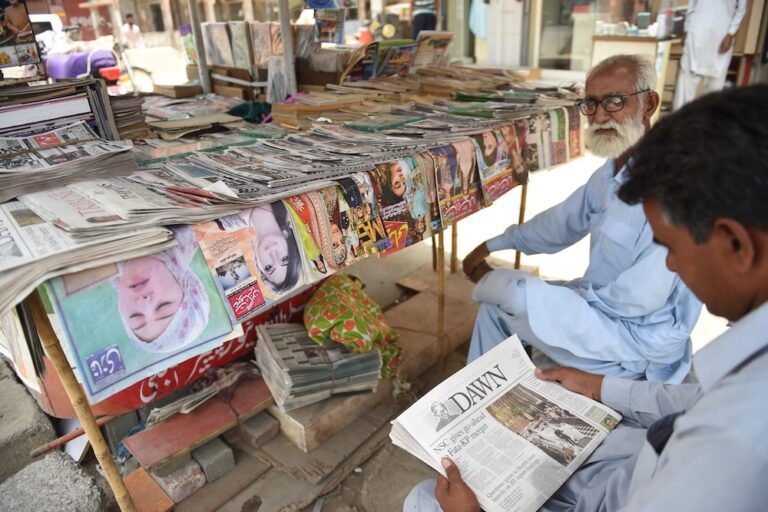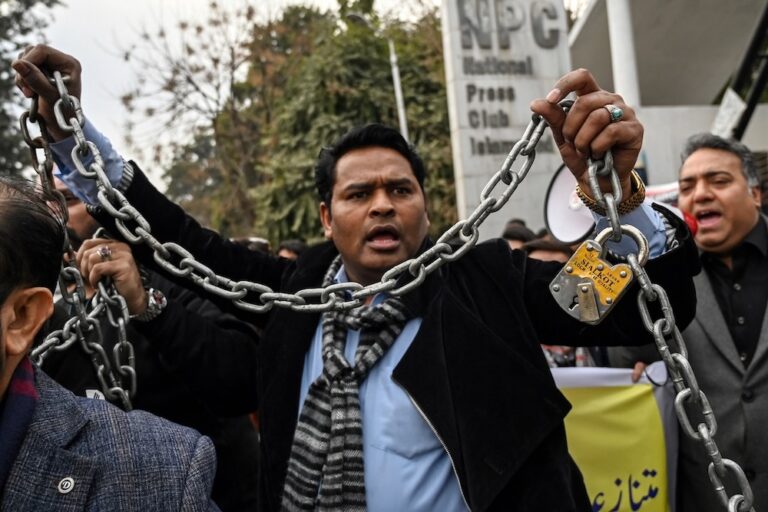The Pakistan Electronic Media Regulatory Authority prohibited broadcasters from airing speeches of an absconder or a proclaimed offender, which is widely believed to be an attempt to deny airtime to the country's former prime minister. Reporting about a gang-rape incident has been restricted as well.
This statement was originally published on pakistanpressfoundation.org on 3 October 2020.
Pakistan Press Foundation (PPF) is concerned by recent directives by the Pakistan Electronic Media Regulatory Authority’s (PEMRA) prohibiting the broadcast of content of vital public interest on electronic media in Pakistan.
PEMRA has issued a directive prohibiting the coverage of the gang-rape of a mother in front of her children on the motorway, that shocked and outraged the country. PEMRA has also prohibited television channels from broadcasting any speech, interview or public address of an absconder or a proclaimed offender, a step that is widely believed to be an attempt to deny airtime to Nawaz Sharif, a former prime minister and leader of the opposition Pakistan Muslim League (PML-N) political party.
These directives by PEMRA make it difficult for the media to cover key political and current affairs. Placing a blanket ban on coverage acts as a tool for muzzling free speech in Pakistan and in turn restricts citizens’ access to information. PPF believes is the right of the citizens to be able to access information and by prohibiting the media from covering certain developments, this right to information is restricted.
While it is the role of PEMRA to ensure content being aired by the electronic media is in line with existing laws, the selective use of these laws in order to muzzle free and fair coverage is an alarming development.
On October 1, PEMRA prohibited the broadcast and rebroadcast of any speech, interview or public address of an absconder or a proclaimed offender on TV channels. According to the daily Dawn, PEMRA referred to its own directives from October 2019 saying that they had “directed all satellite television channel licensees to form an in-house committee to ensure compliance with the Electronic Media Code of Conduct 2015”. Additionally, PEMRA referenced various Supreme Court decisions in 2016 and 2019.
Both the Pakistan Federal Union of Journalists (PFUJ) and the Human Rights Commission of Pakistan (HRCP) have criticized the move.
In a statement PFUJ President Shahzada Zulfiqar and Secretary General Nasir Zaidi said that PEMRA was following “double standards and taking dictation from those who are against media and freedom of speech and expression”. They noted that requests to ban speeches of former military ruler retired General Pervez Musharraf and Pakistan Awami Tehreek leader Allama Tahirul Qadri, who were absconding, had been rejected.
PFUJ asked the government to guarantee freedom of speech and expression and to “avoid practicing double standards and interface in the working of PEMRA”.
The next day on October 2, PEMRA issued another directive, this time prohibiting media coverage of a case regarding FIR 1369/2020, on the Sialkot motorway gang-rape, more commonly referred to as the Lahore motorway rape case, where a woman was gang-raped in the outskirts of Lahore leading to outrage and protests by citizens.
In its directive, the media regulatory body quoted an order by an administrative judge of the Anti-Terrorism Court in Lahore which stated: “In the instant case one of the accused has been shifted to the judicial lock up for the purpose of an identification parade and if media coverage of the instant case is not stopped it will certainly diminish the evidentiary worth of the material collected by the prosecution”.
The order quoted added that it was an offence related to sex and due to media coverage the victim and their family would be “disgraced”. The order requested PEMRA to stop coverage of the case on electronic, print and social media.
In light of this, PEMRA directed all satellite TV channels to comply with the order and refrain from any content regarding the case.
PPF believes that the selective application of the law by the regulatory body remains concerning. A free press is the core of a democracy and it is alarming to see the electronic media regulatory authority acting to curtail Pakistani citizens’ access to information.



